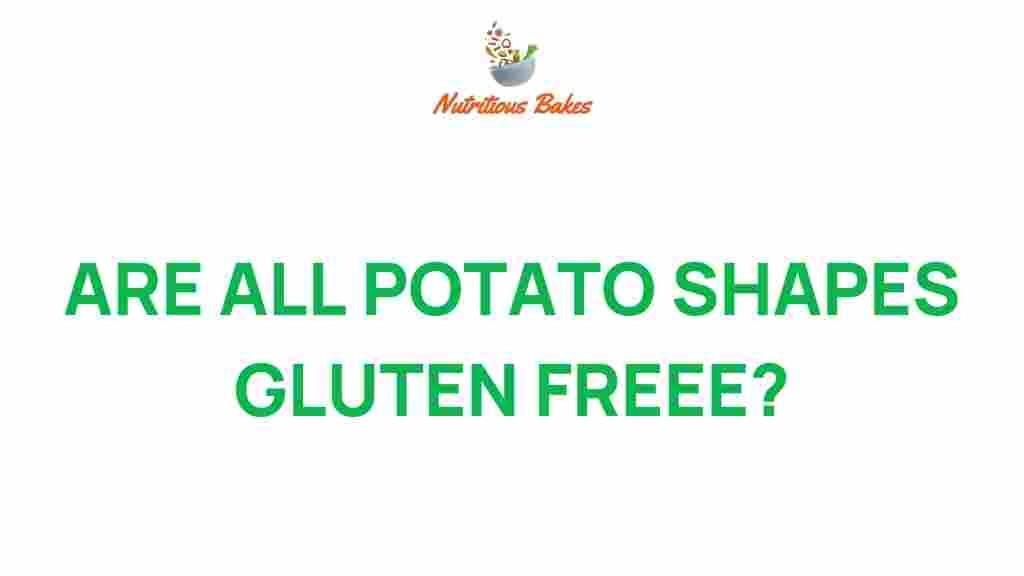Are All Potato Shapes Truly Gluten-Free?
When it comes to dietary restrictions, particularly for those with celiac disease or gluten sensitivity, the question of whether potatoes are gluten-free is often raised. Potatoes are beloved across the globe, appearing in various shapes and forms, from fries and chips to mashed potatoes and baked varieties. But do all potato shapes truly adhere to gluten-free standards? In this article, we will explore the nutritional aspects, culinary myths, food safety, and allergens related to potatoes and their shapes to uncover the truth about their gluten-free status.
Understanding Gluten and Its Impact on Health
Gluten is a type of protein found in wheat, barley, and rye. For individuals with celiac disease, consuming gluten can lead to serious health issues, including:
- Intestinal damage
- Malnutrition
- Autoimmune responses
- Increased risk of other health conditions
For those with gluten sensitivity, even small amounts of gluten can cause discomfort and gastrointestinal issues. Therefore, understanding which foods are gluten-free is crucial for maintaining health and well-being.
The Nutritional Profile of Potatoes
Potatoes are naturally gluten-free and offer several nutritional benefits, including:
- Rich in vitamins and minerals, such as vitamin C and potassium
- A good source of dietary fiber, especially when eaten with the skin
- Low in calories when prepared healthily
However, the method of preparation and any additional ingredients can affect their gluten-free status. Let’s delve into the various shapes and forms of potatoes to clarify their gluten-free classification.
Different Potato Shapes and Their Gluten-Free Status
Potatoes can be prepared in numerous ways, leading to a variety of shapes. Here’s a closer look at some popular potato shapes and their gluten-free implications:
1. Mashed Potatoes
Traditional mashed potatoes are typically made from just potatoes, butter, and milk, making them gluten-free. However, be cautious of:
- Pre-packaged instant mashed potatoes which may contain gluten as a thickener or stabilizer.
- Flavored versions that might use gluten-containing additives.
2. French Fries
French fries are generally made from potatoes and are gluten-free. However, cross-contamination is a concern if they are cooked in oil used for breaded items. To ensure safety:
- Choose fries from establishments that use dedicated fryers.
- Check if the fries are prepared from scratch without added ingredients.
3. Potato Chips
Most potato chips are gluten-free, but be wary of flavored varieties. Always read labels to avoid chips containing gluten-based flavorings or seasonings. Look for:
- Chips labeled specifically as gluten-free.
- Ingredients free of gluten, such as malt vinegar.
4. Baked Potatoes
Plain baked potatoes are naturally gluten-free. However, toppings can introduce gluten. Ensure that:
- Butter and sour cream are gluten-free.
- Check for gluten in pre-packaged toppings like cheese sauces.
5. Potato Salad
Potato salad can be gluten-free if made with gluten-free ingredients. Watch out for:
- Dressings that may contain gluten, such as those made with soy sauce.
- Pre-packaged versions that may have gluten as a stabilizer.
Common Culinary Myths About Potatoes and Gluten
Many culinary myths revolve around potatoes and gluten. Let’s debunk some of these misconceptions:
Myth 1: All Potato Products Are Gluten-Free
While potatoes are naturally gluten-free, processed potato products can contain gluten due to added ingredients or cross-contamination. Always verify product labels.
Myth 2: Frying Potatoes Makes Them Unsafe for Gluten-Free Diets
Fried potatoes can remain gluten-free if cooked in uncontaminated oil. It’s crucial to ensure that the fryer is not shared with breaded items.
Myth 3: Only Certain Potato Varieties Are Gluten-Free
All fresh potato varieties, whether red, white, or sweet potatoes, are gluten-free. The key lies in how they are prepared.
Food Safety Practices for Gluten-Free Potatoes
For individuals with dietary restrictions, ensuring food safety is paramount. Follow these guidelines to keep your potato dishes gluten-free:
- Read Labels: Always read ingredient lists on packaged potato products.
- Ask Questions: When dining out, inquire about food preparation methods to avoid cross-contamination.
- Cook at Home: Preparing potatoes at home allows for full control over ingredients and preparation methods.
Troubleshooting Tips for Gluten-Free Potato Preparation
If you’re new to cooking gluten-free potatoes, here are some troubleshooting tips:
- Thickening Agents: Use gluten-free alternatives like cornstarch or arrowroot in dishes like potato soup.
- Storage: Store raw potatoes in a cool, dark place to prevent sprouting, which can affect texture and flavor.
- Leftovers: Keep leftover potato dishes sealed to avoid contamination from other foods.
Conclusion: Enjoying Gluten-Free Potatoes Safely
In conclusion, while all fresh potatoes are naturally gluten-free, the preparation and additional ingredients can affect their gluten-free status. By understanding the various shapes of potatoes and implementing food safety practices, individuals with dietary restrictions can safely enjoy these versatile tubers. Always prioritize reading labels, asking questions, and preparing food at home to ensure your meals are truly gluten-free.
This exploration of potatoes and their gluten-free status not only sheds light on culinary myths but also empowers those with dietary restrictions to make informed choices. For further information on gluten-free living, check out this comprehensive guide.
As you continue your culinary journey with potatoes, remember that knowledge is your best tool in navigating dietary restrictions. Embrace the delicious world of gluten-free potatoes, and enjoy every shape and preparation!
This article is in the category Ingredients and created by NutritiousBakes Team
